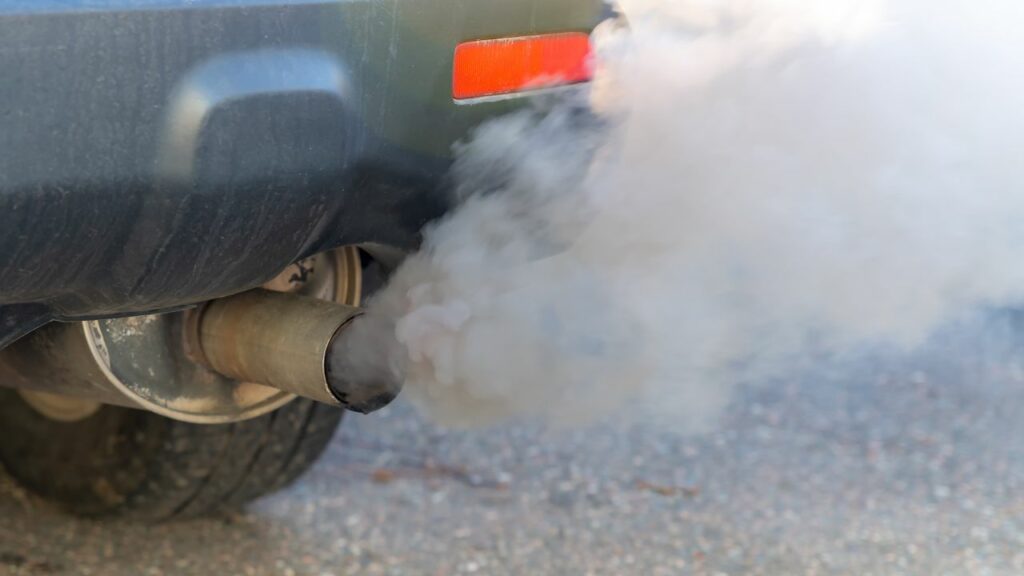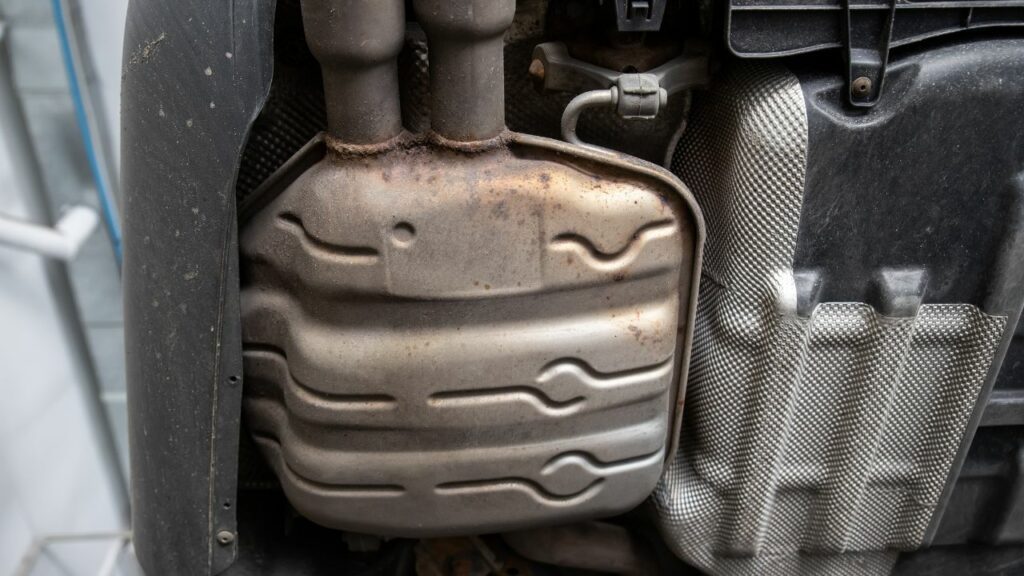A catalytic converter is a vehicle emission control device that reduces harmful gases and pollutants in exhaust gas before it reaches the atmosphere.
Unfortunately, because converters contain valuable metals like platinum, they are often targeted by thieves.
In fact, the National Insurance Crime Bureau estimates that over 50,000 converters are stolen each year in the United States.
But how to know if catalytic converter is stolen? Are there any signs of a stolen catalytic converter?
In this article, I’ll cover 8 possible signs to look out for if you suspect your car is missing a catalytic converter.

Table of Contents
How to Know If Catalytic Converter Is Stolen: 8 Possible Signs
One of the most obvious signs is an increase in noise coming from your vehicle. Without the converter, exhaust gases flow more freely and can create a loud, rumbling sound. You may also notice an increase in exhaust fumes, as well as unusual smells coming from the exhaust system.
Let’s take a closer look at these signs of the stolen catalytic converter so you’ll know what exactly to look for.
Your vehicle is very loud
If you start your car and it’s suddenly a lot louder than normal, there’s a good chance your catalytic converter has been stolen.
The converter acts as a muffler, so without it, exhaust gases flow more freely and create a loud rumbling sound.
Most thieves do not care to install anything in its place, so the noise is usually quite noticeable. You may also notice that your car starts to shake or vibrate more than usual.
Check engine light is ON
If you see the check engine light come on and do not notice any other fault in your car, it could be a sign that your catalytic converter has been stolen.
The light may come on because the oxygen sensor is no longer functioning properly without the converter.
The oxygen sensor monitors the amount of oxygen in the exhaust gases and sends a signal to the engine control unit (also known as ECM).
Once the ECM detects this error, it will turn on the check engine light, and to disable this faulty error code, you will need to either replace the catalytic converter or get it professionally reset it with a scan tool.
However, if you drive vintage or older cars, this feature may not be available, and the check engine light may not come on.
Low-end torque is reduced
Low-end torque is a car’s ability to produce rotational force at low revolutions per minute (RPMs).
It is important for acceleration and hill climbing, as the engine doesn’t have to work as hard to generate the necessary power.
If you have a powerful car and your catalytic converter gets stolen, you may notice a reduction in low-end torque.
This is because the catalytic converter helps to convert harmful gases into less harmful ones.
Without it, these gases flow more freely and can make your car feel a bit sluggish. You may also notice that your car takes slightly longer to accelerate from a stop.
While there’s not a big difference in performance, if you’re an enthusiast driver, you’ll quickly notice this loss.
You are getting a headache when your windows are down
Catalytic converters fitted to exhaust systems are able to reduce vehicle carbon monoxide emissions by 95%.
If you start to get headaches or feel nauseous when driving with the windows down, it may be a sign that your catalytic converter has been stolen or it’s faulty.
Without a working catalytic converter, harmful gases like carbon monoxide can enter the cabin more easily.
It can be very harmful since you’ll be exposed to 20 times more carbon monoxide than you usually do.
Even at low levels, carbon monoxide can cause headaches, and dizziness, and eventually lead to death.
So if you start feeling unwell when driving, make sure to pull over and get some fresh air immediately.
Next, you should bring your car to a mechanic to have it checked out as soon as possible, as this is a serious safety issue.
Increase in exhaust fumes
Generally, you wouldn’t worry about exhaust fumes as they are mostly invisible.
But if you start to see more exhaust fumes than usual, or if the fumes smell different, it could be a sign that your catalytic converter has been stolen.
If the converter is not working properly, harmful gases like carbon monoxide can escape from the exhaust system and enter the cabin or become visible outside.
You may notice a black sooty substance coming from the exhaust pipe, or a strong smell of sulfur.
If you see or smell anything unusual, make sure to get your car checked out by a mechanic as soon as possible.
Missing parts under vehicle leading to muffler
Visual inspection is definitely one of the best ways to know if the catalytic converter is stolen.
If you suspect anything strange with your car, you should get on your knees and try to take a look at the components found under your vehicle.
In most cars, catalytic converters are located near the muffler so take a closer look at the y-pipe and exhaust manifold as they usually need to be cut in order for the thief to remove the catalytic converter.
If you see any missing or damaged parts or holes where they shouldn’t be, it is likely that your catalytic converter has been stolen.
If you see anything suspicious, make sure to get your car checked out by a mechanic.

An open pipe
When thieves steal a catalytic converter, they will not bother to put another pipe in place of it.
This means that if your catalytic converter is stolen, you will see an open pipe leading from the exhaust manifold to the muffler.
Of course, this is not something you would normally see so make sure to regularly inspect the underneath of your car to see if anything is out of place.
If you do find an open pipe, it’s likely that your catalytic converter has been stolen and you should get your car checked out by a mechanic as soon as possible.
You drive a target vehicle
It might not come off as a surprise that there are certain vehicle types or models that are more likely to have their catalytic converters stolen than others.
Thieves usually target newer cars or those that are easy to access like SUVs and trucks.
Other popular target vehicles are Toyota Prius, Honda Accord, Ford F-150, delivery vehicles, hybrid sedans, and luxury vehicles.
Below is a table we created to give show you the most and least likely cars to have their catalytic converter stolen.
If you live in an area where catalytic converter theft is rising, it will make sense to choose a car that’s least likely to be targeted.
What to Do If Your Catalytic Converter Is Stolen
While there isn’t much you can do to catch the thief, there are three things you can do after your car’s catalytic convert is stolen.
Call the cops
Stealing a catalytic converter is a punishable offense so if you think your catalytic converter has been stolen, the first thing you should do is call the police and make a report.
This will not only help you start an insurance claim but may also help the police catch the thief if they are still in the area.
Contact your vehicle insurance provider
If you have got comprehensive vehicle insurance, your vehicle insurance will most cover the cost of replacing a stolen catalytic converter.
But before you contact your insurance provider, make sure to check your policy as some comprehensive insurance plans may not cover this type of theft.
If you’re not sure whether your insurance policy covers catalytic converter theft, you can always call your provider and ask.
Visit a mechanic
Once you have made a police report and contacted your vehicle insurance provider, the next thing you need to do is visit a mechanic.
A qualified mechanic will be able to tell you whether your catalytic converter needs to be replaced and give you an estimate of the cost.
For whatever reason, if you don’t want the catalytic converter to be replaced, ask them to disable the check engine light faulty code using a scan tool so you won’t be annoyed while driving in the future.
How To Prevent Catalytic Converter Theft
The simplest thing is to install an anti-theft device. This will make it difficult for thieves to steal the converter. You can check Amazon for different types of anti-theft devices or visit a mechanic.
You should also try to also park in safe locations where there is a lot of foot traffic.
Finally, you can paint the converter or hide the VIN number so the thieves won’t be able to sell it for a good price in scrapyards.
FAQs
Why are catalytic converters stolen?
Catalytic converters contain precious metals like rhodium, palladium, and platinum which can be sold for a high price. Since the scrap price has seen a boost in recent times, most thieves are targeting these parts to make some quick money.
How much do thieves get for a catalytic converter?
Thieves will get about $20 to $400 for standard catalytic converters whereas they could get up to $1500 for the ones from hybrid or luxury vehicles.
Who buys stolen catalytic converters?
There are a number of recycling centers and scrap yards that will purchase stolen catalytic converters. However, most reputable businesses will not buy these parts and ask for a title or registration along with a photo ID.
Can you drive without a catalytic converter?
Yes, you can drive without a catalytic converter for a short period but it’s not recommended to do so for an extended period as it can affect your car’s engine and your vehicle will now release more pollution in the air.
Do all cars have a catalytic converter?
No, not all cars have a catalytic converter. Electric cars (they don’t need it) and cars that were manufactured before 1974 generally don’t have a catalytic converter since the rules weren’t as strict back then.
Conclusion
Catalytic converter theft is a serious problem and whether or not you are a victim, you should know the signs of a stolen catalytic converter and what to do afterward.
If you drive a vehicle that’s most likely to be targeted by thieves, you should take some preventative measures to avoid becoming a victim yourself.
Further, try to get yourself comprehensive vehicle insurance that will help you cover the cost of replacing a stolen catalytic converter.

Robert Bacon is a car nerd and automotive lover who has dedicated his life to understanding the inner workings of vehicles. He holds a degree in mechanical engineering and has spent years working as a mechanic and engineer for some of the world’s top car companies. In his spare time, he enjoys writing about cars on this blog and tinkering with his 2016 Toyota Mirai in his garage.